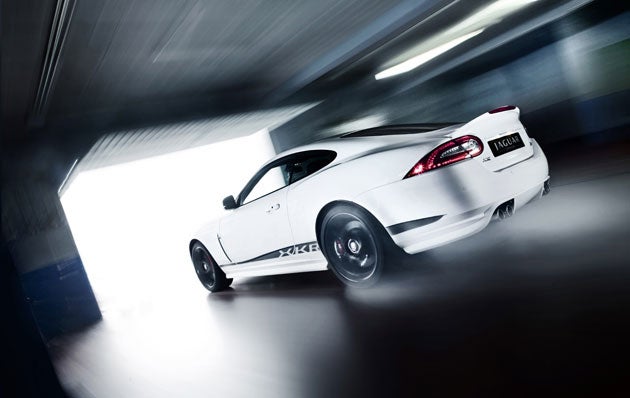Jaguar XKR and XKR Speed Pack

Your support helps us to tell the story
From reproductive rights to climate change to Big Tech, The Independent is on the ground when the story is developing. Whether it's investigating the financials of Elon Musk's pro-Trump PAC or producing our latest documentary, 'The A Word', which shines a light on the American women fighting for reproductive rights, we know how important it is to parse out the facts from the messaging.
At such a critical moment in US history, we need reporters on the ground. Your donation allows us to keep sending journalists to speak to both sides of the story.
The Independent is trusted by Americans across the entire political spectrum. And unlike many other quality news outlets, we choose not to lock Americans out of our reporting and analysis with paywalls. We believe quality journalism should be available to everyone, paid for by those who can afford it.
Your support makes all the difference.Jaguar's current line-up is probably stronger than any the company has fielded in decades. Most attention has focused in the last year or two on the company's big saloons, the XF, which replaced the S-Type, and the new XJ introduced this year, both of which are providing much stiffer competition for the German prestige brands than their conservatively styled predecessors.
The renewal – and revival - of the Jaguar line-up, though, began in 2006 with the current XK coupé and convertible, and these cars are still selling strongly (deliveries in the UK market were up 22.5 per cent in the first half of this year) thanks to a series of tweaks and updates aimed at keeping them fresh.
For 2009, the previous 4.2-litre engine V8 was replaced with a larger 5.0 litre unit; the current engine, like the old one, is available available in supercharged form, and this is the version that is used in the sportiest XK, the XKR. While the standard 5.0 delivers 385 horsepower, the supercharged engine is good for 510; the difference in output means that the XKR is capable of accelerating to 60mph in 4.6 seconds instead of 5.2.
All XKs, including the XKR, though have previously been limited to 155mph, but that's a restriction that has been now been eased with the availability of a new £3,500 Speed Pack for 2011 model year cars, one feature of which is a recalibrated engine management system that permits a top speed of 174mph.
Coupés fitted with the Speed Pack get a modified front splitter and a bigger rear spoiler aimed at improving high-speed stability as well. The Speed Pack is also available in conjunction with a so-called Black Pack (£4,000), which adds further visual excitement in the form of black gloss alloy wheels (officially described by Jaguar as "menacing"), black gloss exterior trim, and red brake callipers.
These exterior changes are a matter of taste, of course, and it's questionable how useful to most buyers a hike in top speed from 155mph to 174mph is. But is it really worth buying the sporty XKR when the standard XK, with its normally aspirated V8 engine is already very quick?
In order to demonstrate the difference between the standard XK and the XKR, Jaguar recently set up a series of tests in which I was able to take part. This involved the sorts of things you'd expect; cornering, a slalom through a series of traffic cones and braking.
The interesting thing about it was that the entire exercise was conducted not on a sweeping race track at three-figure speeds, but at less than 30mph in a comparatively confined space.
The differences between the standard car and the XKR were easily detectable; the XKR remained flatter during cornering, its brakes were noticeably sharper and its steering felt that way too – all the more remarkable given that the XKR's steering isn't more highly geared than the standard car's.
In all other respects, the 2011 XK remains the same, strong, attractive product it was before, and that applies to the XKR as well. The XKR isn't in some absolute sense better than the standard car in terms of its feel – the differences are largely a matter of taste. But if you do buy an XKR and just end up driving it at normal speeds on British roads, you won't be missing out.
Jaguar XKR and XKR Speed Pack
Price: £75,500 (Speed Pack £3,500)
Engine: supercharged 5.0 litre V8, 510 horsepower and 625 Newton metres of torque
Top speed: electronically limited to 155mph, 174mph with the Speed Pack due to recalibrated engine management system
0-60mph: 4.6 seconds
Consumption: 16.9mpg
CO2 emissions: 388g/km
Rivals: Aston Martin Vantage, Porsche 911, Mercedes SL
Join our commenting forum
Join thought-provoking conversations, follow other Independent readers and see their replies
0Comments